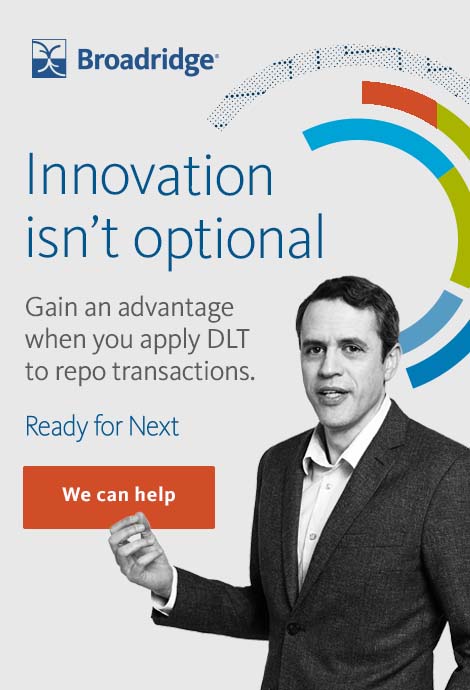Securities Finance Times spoke with Val Wotton, DTCC’s managing director, product development and strategy of repository and derivatives services, to learn more about how DTCC helps firms with trade reporting obligations, especially as many firms are now in need of a new trade repository for SFTR reporting
It’s been over a year since the first wave of Securities Financing Transactions Regulation (SFTR) went live and today the trade reporting landscape continues to evolve at a rapid pace. In August, UnaVista announced it will discontinue its trade repository (TR) services for SFTR, effective from 31 January 2022.
It’s no secret that the process of porting TR data to a new service provider can be challenging. DTCC, who operate the leading trade repositories for both securities finance and derivatives transactions, is working closely with UnaVista to ensure a smooth transition for firms who opt to leverage DTCC’s EU or UK trade repository for their SFTR reporting needs.
“We are no strangers to helping firms seamlessly navigate the move from another TR to DTCC’s Global Trade Repository service (GTR),” shares Wotton. “Nearly a year ago, many firms transitioned to GTR as CME decommissioned its European and Australian trade repositories. I recall one client personally thanking me for how easy the transition was for his firm. It’s testimonials like this that make me proud to be a part of the DTCC community, where we put client satisfaction at the very top of the priority list.”
Easy Onboarding and Comprehensive Client Service
“As the trade reporting landscape continues to change and evolve, we are committed to continuously improve, innovate, and reimagine how to best serve our clients in helping to comply with the various regulations that continue to challenge reporting firms’ operations,” says Wotton.
DTCC’s award-winning SFTR service processes approximately 85 per cent of all SFTR trade reporting volume across the UK and Europe, processing over 115 million messages a month for over 800 clients. “I believe that a key reason we have predominant market share is because of our simplified onboarding programme and robust client service. These are critical contributors to a superior client experience,” he continues.
The SFTR service leverages the GTR infrastructure, the industry’s trade reporting solution of choice for OTC and exchange-traded derivatives, serving approximately 80 per cent of the global market. GTR operates locally registered or licensed trade repositories across the globe, supporting reporting regimes in Australia, Europe, Hong Kong, Switzerland, Japan, Canada, Singapore, the UK and the US.
Addressing Pre and Post-Reporting Needs
For the past decade, financial firms have experienced waves of new and revised regulations around transaction reporting. And more changes will be rolling in over the next few years as nearly all jurisdictional rules for derivatives trade reporting undergo rewrites to adopt industry-recommended standards.
Launched in early 2020, and expanded in December 2020 with DTCC’s acquisition of the Compliance Management Reporting System platform (CMRS) from Publicis Sapient, DTCC Report Hub enables firms to manage their global derivatives, Markets in Financial Instruments Directive II (MiFID II) and Securities Financing Transactions Regulation (SFTR) pre and post-trade reporting requirements with a single vendor solution.
Compliance Challenges
Among the regulations resulting from the 2008 financial crisis were reporting mandates for derivatives transactions. Jurisdictions rolled out their respective rules at different times and without close coordination. The result: many differences in reporting formats, trade data elements and other parameters, which are now triggering a new round of rule revisions designed to increase standardisation across jurisdictions.
“This post-crisis global regulatory surge and ongoing failure to harmonise rules from one reporting regime to another has necessitated continual modifications to firms’ technology platforms,” says Wotton. “After a decade of patches to accommodate one new rule or update after another, the trade processing and reporting infrastructure in most firms today is duplicative and inefficient.”
For firms that have developed their own pre and post-reporting capabilities, the upcoming rewrites of derivatives rules – which will include adoption of Common Data Elements (CDE) and Unique Product Identifiers (UPI) for reporting – will spur yet more updates to their infrastructure and further burden already-stressed capacity and functionality.
Evolving regulatory provisions will also necessitate ongoing refinements to firms’ data management and messaging processes. For example, if, as expected, regulators adopt the ISO 20022 message scheme for derivatives CDE, trade data will need to be normalised to meet this new standard – tedious work that many firms are likely to need help in completing.
“The strain on internal staff, processes and platforms caused by ever changing regulations have led some firms to turn to one or more third-party solutions providers to deliver discrete pre and post-reporting functionality,” describes Wotton. “But the result can be a patchwork of solutions that are not integrated with one another and require multiple connections,” he continues.
Furthermore, use of solutions from different providers can deprive firms of the comprehensive, cross-jurisdictional regulatory coverage they need to manage pre and post-reporting activities for all reporting regimes, each of which has varying rules. Without a unified solution, firms could face increased compliance risk and cost.
Unified solution for Pre and Post-Reporting Workflows
Given the trade reporting challenges ahead – including the continuing, regime-specific changes to derivatives mandates, the complexity of SFTR reporting and the sheer difficulty of managing trade reporting across multiple asset classes and jurisdictions – a unified, single-vendor suite of services like DTCC Report Hub can help firms mitigate risk, enhance operational efficiencies and reduce costs associated with regulatory reporting compliance.
For firms that have solutions developed in-house, a move to DTCC Report Hub frees up staggering amounts of staff time and internal resources. DTCC Report Hub’s single-vendor model provides the consistent, streamlined functionality that is generally missing when firms utilise multiple vendors.
Wotton explains that “The DTCC Report Hub platform is a game changer for pre and post-trade reporting services. By delivering a unified, single-vendor pre and post-reporting platform, firms can consolidate reporting activities for multiple jurisdictions – US, UK, Europe, Canada, Israel, Singapore, Australia, and Hong Kong – and be prepared for forthcoming rule additions and changes.” This breadth of coverage can help firms maximise their operational efficiencies and compliance-risk mitigation, reduce costs and free-up staff to focus on other priorities.
With its extensive suite of pre-reporting services, DTCC Report Hub streamlines the complex workflows required to prepare trade data for submission to TRs or ARMs. Starting with data normalisation and transformation – including to accommodate the ISO 20022 messaging scheme – this suite provides data enrichment, jurisdictional eligibility analysis, a customisable rules engine and advanced exception management and reprocessing.
Closing the Reporting Loop
In addition to interfacing with TRs and ARMs to facilitate trade submissions, DTCC Report Hub also delivers the post-reporting functionality. Its reconciliation tool applies reporting completeness and accuracy checks on TR end-of-day reports against a client’s internal systems. DTCC Report Hub can also provide extensive data analytics to help firms better manage reporting completeness, accuracy, and timeliness.
Even with a solution like DTCC Report Hub, firms will still need to keep pace with global regulatory output by having up-to-date reporting processes, controls, systems, and governance. Firms that have repeatedly modified their infrastructure in response to new and revised mandates may need a top-to-bottom overhaul if they are to manage regulatory reporting risk in a cost-efficient manner. DTCC Consulting Services experts can help firms analyse their infrastructure performance and data quality and assist them in evaluating whether certain enhancements or redesigns are warranted.


